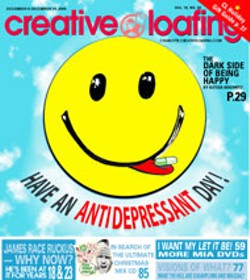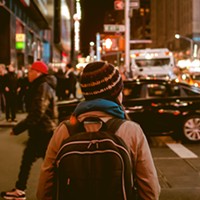Page 2 of 4
SSRI stands for selective serotonin reuptake inhibitors, and the substance is believed to relieve depression by boosting levels of serotonin, a "feel good" chemical in the brain. SSRIs quickly gained popularity; unlike tricyclics, they didn't generate the same side effects. Instead of weight gain and blurred vision, a user might experience dry mouth or a limited libido, effects patients more willingly endured.
By the early 1990s, Prozac was all the rage. Books such as Prozac Nation, which documented a woman's bouts with depression, and Listening to Prozac, which hailed the SSRI as a wonder drug, quickly became best-sellers. Other drug manufacturers saw the success of Eli Lilly and jumped on the SSRI bandwagon. The result: the manufacture and release of six FDA-approved SSRIs in a matter of 12 years. The drugs saturated the psychiatric field; a 15-minute consultation often would end with a patient holding a prescription for Zoloft or Celexa, Luvox or Effexor, Paxil or Prozac.
It was an easy solution for the millions suffering from depression and other mental disorders. For some, it worked.
Sixteen-year-old Tess Robinette had made a habit of locking the door in her Marietta, Georgia home exactly six times every day. She wiped the inside of each shoe three times to make sure they didn't contain bugs before sliding her foot in. She counted the number of times -- nine on each side -- she swiped deodorant across her armpits. If someone standing next to her accidentally brushed her shoulder, she made a point of re-brushing the person's sleeve, thinking the second encounter would cancel any germs transferred during the first. Fearing the touch of another person, she'd never been on a date. Still, after she turned 17, she became convinced she had AIDS. Even though she was a virgin, she took an HIV test (it came out negative) -- and fainted during the procedure, prompting her parents to take her to a psychiatrist. After her first visit, Robinette was diagnosed with obsessive-compulsive disorder. Her psychiatrist told her that antidepressants could help treat the disorder and prescribed Zoloft. In the beginning, it didn't seem to work. Robinette would inspect the bottle three times on each side before opening it to take her daily dose. After a few weeks her condition improved, but she still experienced OCD tendencies. Her doctor decided to switch her to Luvox, which is used specifically to treat obsession, though it produces more side effects than Zoloft. Within a month, almost all of Robinette's obsessive urges disappeared. She no longer peered under the bed three times each night before resting her head on her pillow. And she no longer feared holding a boy's hand.
"I'm able to live my life now," Robinette says. "If I hadn't taken [antidepressants] I wouldn't be comfortable going to a concert or a bar." Because of various side effects ranging from fatigue to diarrhea, Robinette has tried three SSRIs. She is now on Prozac and says it's helped her maintain a normal lifestyle. In fact, Robinette just entered pharmacy school at the University of Georgia, saying her ordeal spurred her interest. It's taken time, patience and experimentation, but Robinette says the trial-and-error process has been worth it. "I'm much happier now," she says. "Thanks to these pills, I can be me."
One psychiatrist we spoke to was so supportive of SSRIs, he told us, "I've got 200 kids on an antidepressant right now, and if people took them away, I'd have parents up in arms, rioting in the streets."
The drug companies, too, might be rioting. In 2001 alone, drug manufacturer Pfizer raked in $2.1 billion from Zoloft sales, more than a quarter of the company's total revenue. The New York Times reported in September that in a yearlong period ending in March, the worldwide sales of antidepressants totaled almost $20 billion.
A majority of the revenue can be chalked up to the impact of antidepressant claims in television commercials. Such commercials had been highly restricted until 1997, when pharmaceutical companies' relentless lobbying ended with the FDA allowing consumer-directed ads to be aired.
Karen Barth Menzies, an attorney who specializes in antidepressant litigation and who is looking into Bolin's situation, calls the ensuing marketing blitz "one of the best promo jobs ever."
The ads typically begin with a narrator vaguely addressing what seem like mild issues: "Are you nervous in crowds?" "Do you lack energy?" "Do you find it hard to concentrate?" The commercials then introduce the drug and cut to people smiling in pastoral settings, barbecuing, holding hands on the beach or raking leaves in the front yard.
Psychotherapist Leslie MacKinnon says that in addition to being turned off by these commercials, she's bothered by the pervasiveness of drug company representatives' visits to doctors' offices, where the reps can try to influence physicians' drug choices. MacKinnon says the drug reps -- as many as four in a span of 30 minutes -- descend on clinics with offers of golf getaways and luxurious vacations as incentives to prescribe their particular antidepressant.
Latest in Cover
More by Alyssa Abkowitz
-

Sex Sells
Dec 28, 2005 -

.01 Tolerance
Dec 14, 2005 - More »
Calendar
-

Wine & Paint @ Blackfinn Ameripub- Ballantyne
-

Queen Charlotte Fair @ Route 29 Pavilion
-

NEW WINDOW GALLERY-Pat Rhea-ACRYLIC PAINTINGS-April 05-30 2024 VALDESE, NC 28690 @ New Window Gallery/Play It Again Records
- Through April 30, 12 p.m.
-

TheDiscountCodes
-

Face to Face Foundation Gala @ The Revelry North End
-
Esports in Charlotte Takes Off: A Guide to Virtual Competitions and Betting
-
Homer's night on the town 41
If you drank a shot with the Knights mascot on Sept. 20, you were basically harboring a fugitive
-
Beauty Industry Trends To Look Out For In Charlotte In 2022










